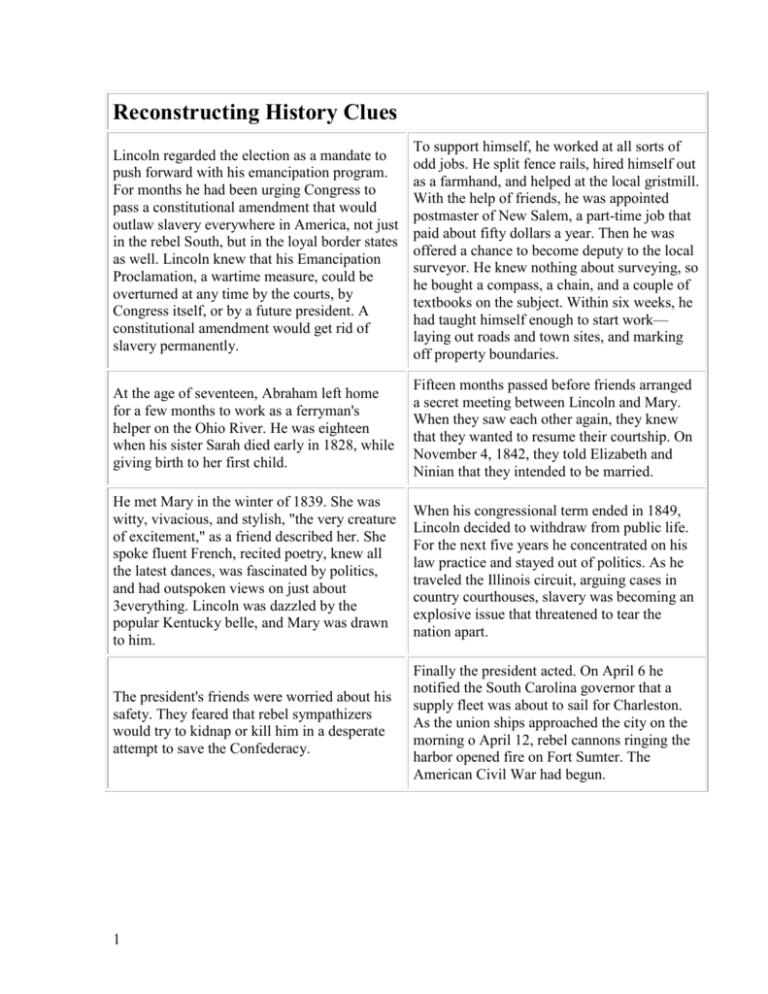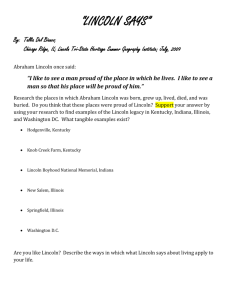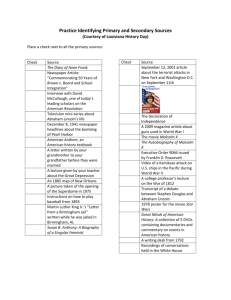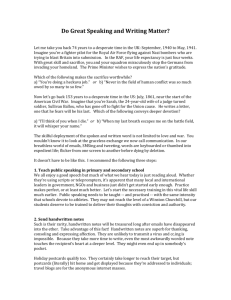Reconstructing History Clues
advertisement

Reconstructing History Clues Lincoln regarded the election as a mandate to push forward with his emancipation program. For months he had been urging Congress to pass a constitutional amendment that would outlaw slavery everywhere in America, not just in the rebel South, but in the loyal border states as well. Lincoln knew that his Emancipation Proclamation, a wartime measure, could be overturned at any time by the courts, by Congress itself, or by a future president. A constitutional amendment would get rid of slavery permanently. To support himself, he worked at all sorts of odd jobs. He split fence rails, hired himself out as a farmhand, and helped at the local gristmill. With the help of friends, he was appointed postmaster of New Salem, a part-time job that paid about fifty dollars a year. Then he was offered a chance to become deputy to the local surveyor. He knew nothing about surveying, so he bought a compass, a chain, and a couple of textbooks on the subject. Within six weeks, he had taught himself enough to start work— laying out roads and town sites, and marking off property boundaries. At the age of seventeen, Abraham left home for a few months to work as a ferryman's helper on the Ohio River. He was eighteen when his sister Sarah died early in 1828, while giving birth to her first child. Fifteen months passed before friends arranged a secret meeting between Lincoln and Mary. When they saw each other again, they knew that they wanted to resume their courtship. On November 4, 1842, they told Elizabeth and Ninian that they intended to be married. He met Mary in the winter of 1839. She was witty, vivacious, and stylish, "the very creature of excitement," as a friend described her. She spoke fluent French, recited poetry, knew all the latest dances, was fascinated by politics, and had outspoken views on just about 3everything. Lincoln was dazzled by the popular Kentucky belle, and Mary was drawn to him. When his congressional term ended in 1849, Lincoln decided to withdraw from public life. For the next five years he concentrated on his law practice and stayed out of politics. As he traveled the Illinois circuit, arguing cases in country courthouses, slavery was becoming an explosive issue that threatened to tear the nation apart. The president's friends were worried about his safety. They feared that rebel sympathizers would try to kidnap or kill him in a desperate attempt to save the Confederacy. Finally the president acted. On April 6 he notified the South Carolina governor that a supply fleet was about to sail for Charleston. As the union ships approached the city on the morning o April 12, rebel cannons ringing the harbor opened fire on Fort Sumter. The American Civil War had begun. 1 The following year he was off to Washington with Mary, four-year-old Robert, and the baby Eddie. They moved into a boarding house on Capitol Hill that catered to Whig politicians. But Mary found that she was bored and unhappy in Washington. After three months, she packed up and left with the boys to spend the rest of Lincoln's term with her family in Kentucky. "I hate to stay in this old room by myself," Lincoln wrote to her. "What did [Robert] and Eddie think of the little letters Father sent them? Don't let the blessed fellows forget father." Then he faced a personal tragedy. His boy Eddie, not yet four, fell gravely ill. After lingering for two months, the child dies on February 1, 1850. Mary collapsed in shock. Robert, who was then six, would remember his mother's uncontrolled sobbing, the dark circles under his father's eyes, the house draped in black. Mary shut herself in her room and stayed there for weeks. Lincoln buried himself in his work. During the third act, Mary reached over to take Lincoln's hand. She pressed closer to him. Behind them, the door to the presidential box was closed but not locked. Lincoln's bodyguard that evening, John Parker, had slipped away from his post outside the door to go downstairs and watch the play. The audience had just burst into laughter when the door swung open. A shadowy figure stepped into the box, stretched out his arm, aimed a small derringer pistol at the back of Lincoln's head, and pulled the trigger. Lincoln's arm jerked up. He slumped forward in his chair as Mary reached out to catch him. Then she screamed. He was born near Hodgenville, Kentucky, on February 12, 1809, in a log cabin with one window, one door, a chimney, and a hardpacked dirt floor. His parents named him after his pioneer grandfather. The first Abraham Lincoln had been shot dead by hostile Indians in 1786, while planting a field of corn in the Kentucky wilderness. Abraham passed his eighth birthday in the lean-to. He was big for his age, "a tall spider of a boy," and old enough to handle an ax. He helped his father clear the land. They planted corn and pumpkin seeds between the tree stumps. And they build a new log cabin, the biggest one yet, where Abraham climbed a ladder and slept in a loft beneath the roof. 2







